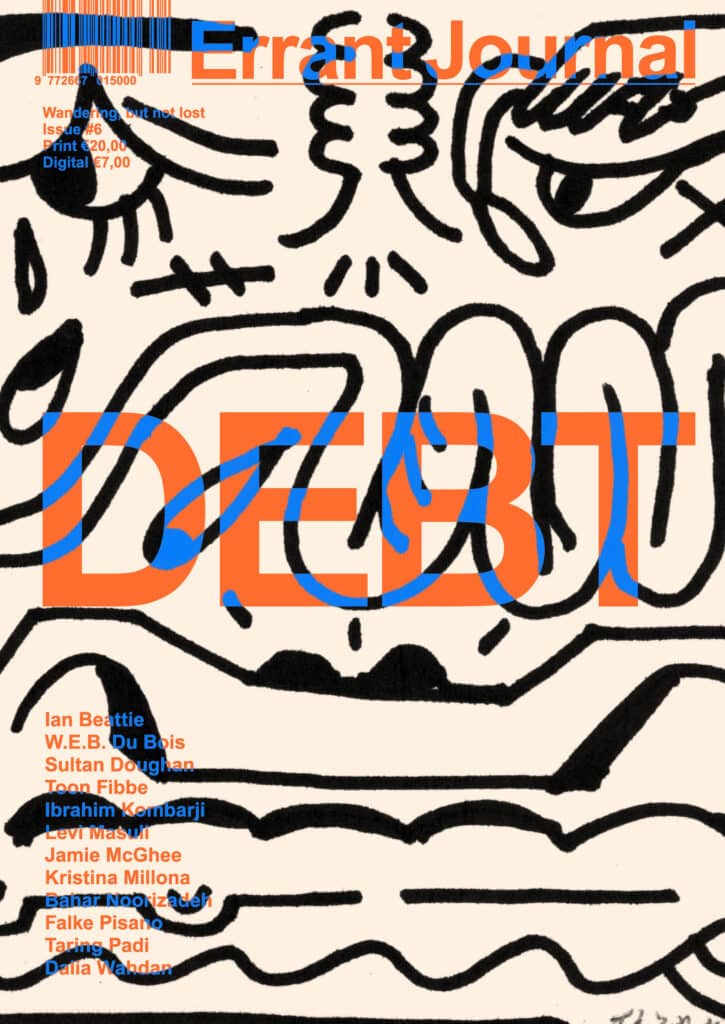
Issue #6
Debt
Errant Journal No. 6 takes up the topic of debt in order to challenge the idea that it is something rational, natural or inevitable. The contributions in the issue address the ways in which debt and its language hold power over us and organize obedience; from its role in geopolitics to its associations with shame and guilt through moral and religious connotations. Together they reveal how the personal is always connected to the structural. Crucially, the issue also features contributions that address ways of thinking about debt outside Western/neoliberal hegemony and introduce instances of resistance to the violence and inequality inherent to debt. We’ve made additional space in this issue to address the intensified struggle for Palestinian liberation and its relations to debt/guilt and finance.
Contributors: Ian Beattie, W.E.B. Du Bois, Sultan Doughan, Toon Fibbe, Ibrahim Kombarji, Levi Masuli, Jamie McGhee, Kristina Millona, Bahar Noorizadeh, Falke Pisano, Taring Padi, Dalia Wahdan
Also see the list of contents and the editor’s note.
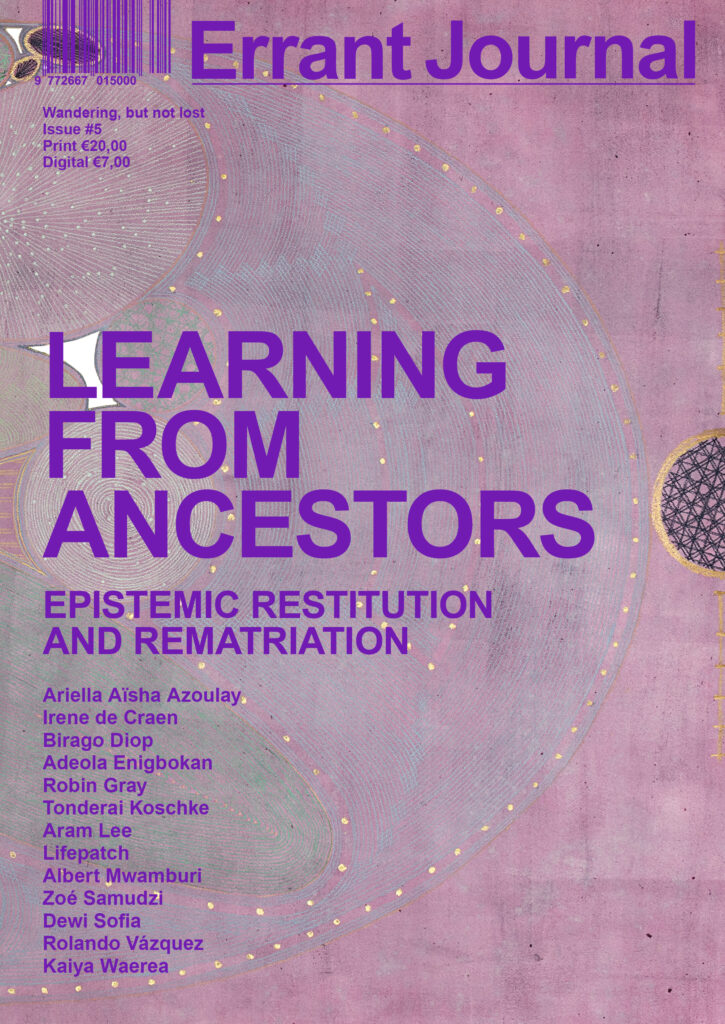
Issue #5
Learning From Ancestors. Epistemic Restitution and Rematriation
Starting from the position that the return of all colonially looted, pillaged, and stolen heritage should take place in full and without hesitation, Errant Journal No. 5 ‘Learning from Ancestors’ wishes to go beyond the question of ‘giving back’, and ask what is given back by whom and to whom, where, and how? In this now seemingly omnipresent discussion, who is speaking, and which voices are being listened to? To do this, as is reflected in the title of this issue, Errant proposes a shift in perspective away from dominant (Western) epistemic authorities to consider other ways of sensing and experiencing the world and let this guide us in the questions we have. This necessarily means that this issue is not just about objects and their return, not just about physical ‘things’ that can change hands and location. It is also an issue about repair, without which restitution could be meaningless.
Contributors: Ariella Aïsha Azoulay, Irene de Craen, Birago Diop, Adeola Enigbokan, Robin Gray, Tonderai Koschke, Aram Lee, Lifepatch, Albert Mwamburi, Zoé Samudzi, Dewi Sofia, Rolando Vázquez, Kaiya Waerea
Also see the list of contents and the editor’s note.

Issue #4
States of Statelessness
With Errant’s 4th issue we tackle the imaginary nature of the nation state, and look into alternative forms of solidarity, community and belonging that are disconnected from or even antagonistic to this form of governance and in which a migrant or otherwise marginalised position can be seen as one of power and resistance. States of Statelessness delves into the diverse manners in which people respond to their precarious relations to nation and nationality in practical, poetic and community-based ways. But more than that, this issue is a celebration of the ways in which people are able to stand their ground, to exist in fluidity, and a commemoration of those before us that have shown that other ‘states’ are possible.
Contributors: Abdul Adan, Isshaq Albarbary, Asia Bazdyrieva, Merve Bedir, Irene de Craen, Michał P. Garapich, Dominique Himmelsbach de Vries, Fabian Holle, Alevtina Kakhidze, Saskia Köbschall, Nilüfer Koç, Elżbieta Mirga-Wójtowicz, Max Ring
Also see the list of contents and the editor’s note.
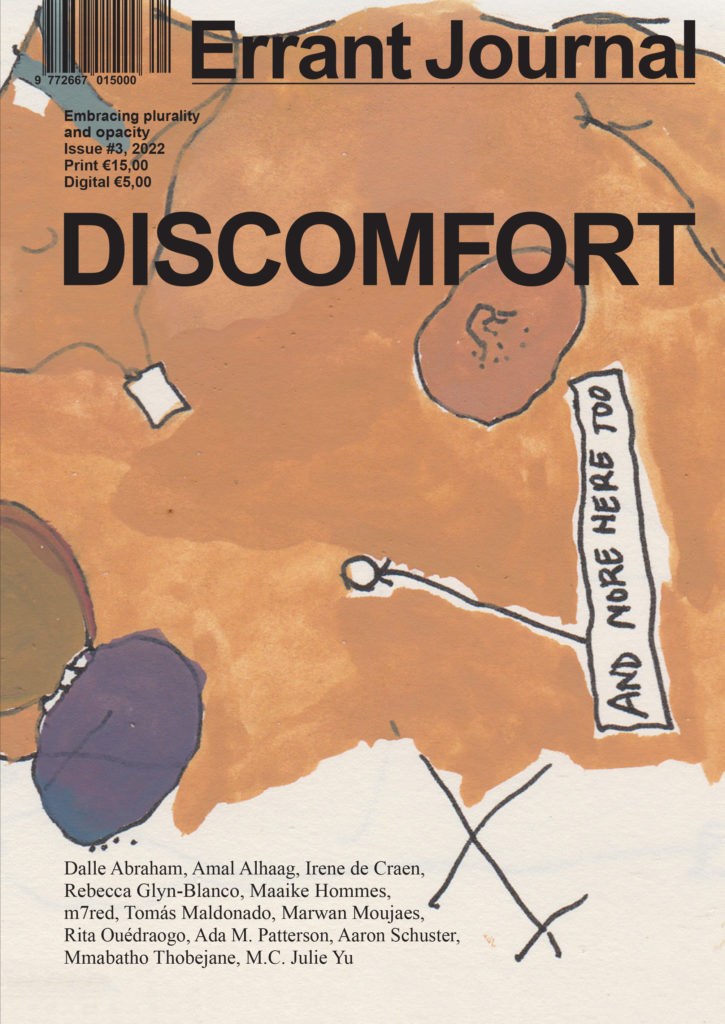
Issue #3
DISCOMFORT
Errant #3 takes the ambiguous feeling of discomfort as a productive space to think from. What if instead of avoiding discomfort, we lean into it, dwell on it, stay with it so as to be able to learn from it? Central to the issue is the presence of discomfort as it accompanies the work of decoloniality, both in positions of marginalisation and of those who perhaps feel their comfort shaken for the first time. The contributions explore discomfort through personal histories, as well as curatorial, architectural & psychoanalytic perspectives.
Contributors: Dalle Abraham, Amal Alhaag, Rebecca Glyn-Blanco, Irene de Craen, Maaike Hommes, m7red, Tomás Maldonado, Marwan Moujaes, Rita Ouédraogo, Ada M. Patterson, Aaron Schuster, Mmabatho Thobejane, M.C. Julie Yu
Also see the list of contents and the editor’s note.
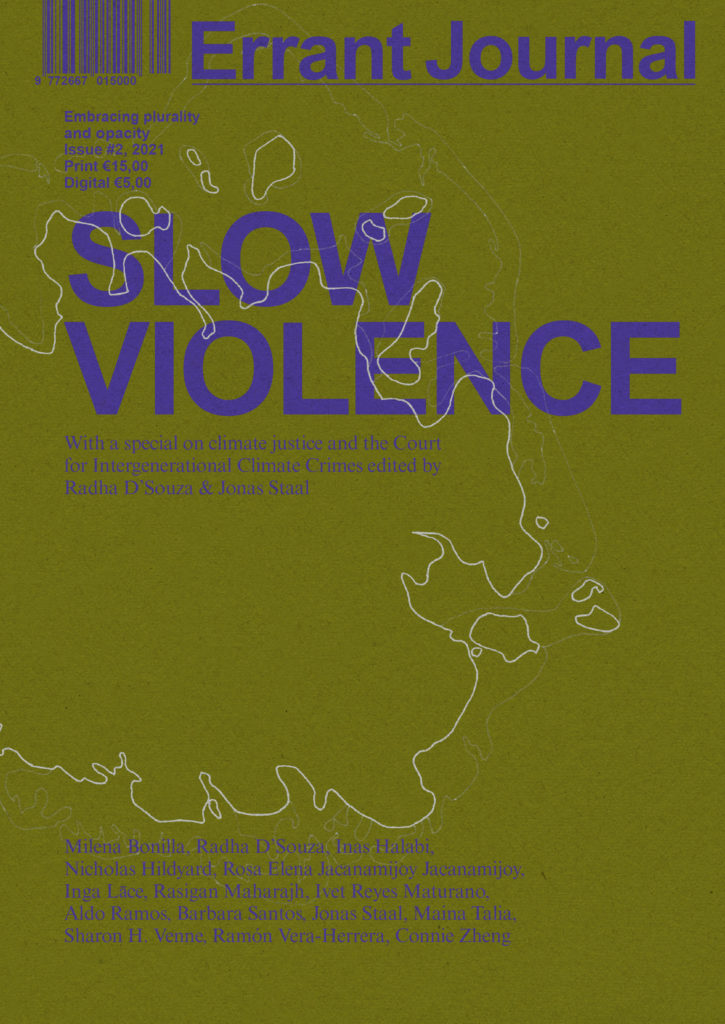
Issue #2
SLOW VIOLENCE
This issue sets off from the term ‘slow violence’ because we believe that the relation with violence should be front and centre in the discussions of the ‘climate crisis’ in order to bring the rather abstract concept of ´climate change´ back in relation to the underlying necropolitics. Moving away from a universal narrative and addressing the different roles people, companies, and nation states play, also opens up the possibility to address the call for climate justice; a topic addressed in a special section of this issue edited by Radha D’Souza and Jonas Staal.
Contributors: Milena Bonilla, Radha D’Souza, Inas Halabi, Nicholas Hildyard, Rosa Elena Jacanamijoy Jacanamijoy, Inga Lāce, Rasigan Maharajh, Aldo Ramos, Ivet Reyes Maturano, Barbara Santos, Jonas Staal, Maina Talia, Sharon H. Venne, Ramón Vera-Herrera, Connie Zheng
Also see the list of contents and the editor’s note.
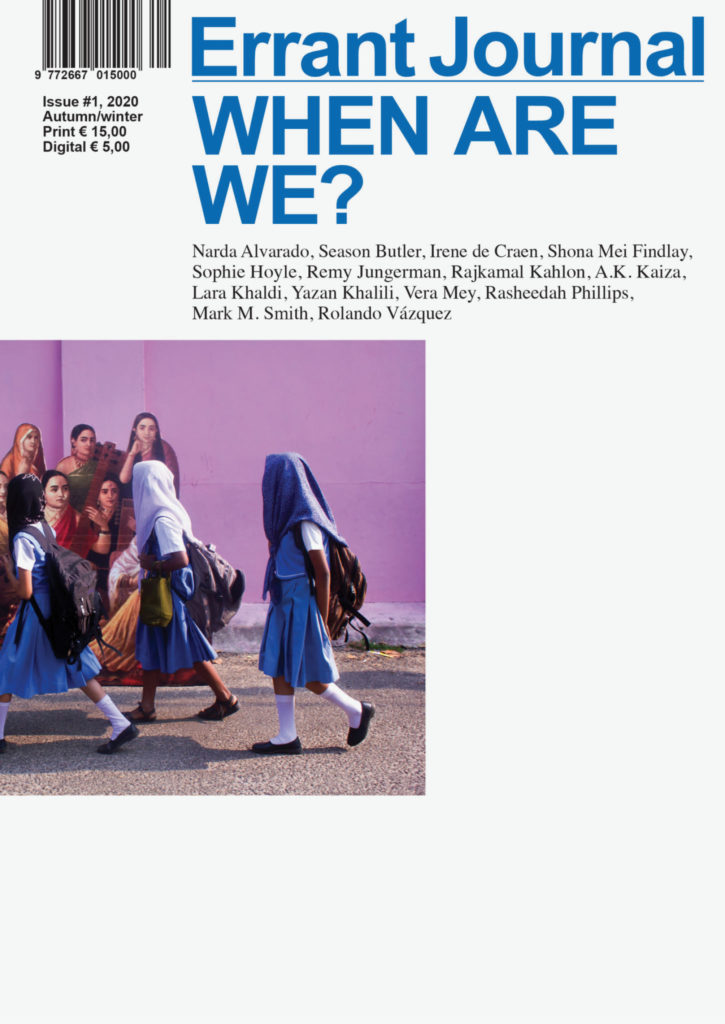
Issue #1
WHEN ARE WE?
The first issue of Errant Journal critically examines the concept of the ‘contemporary’ and questions time’s claim to universality. Titled When Are We? this issue is about the politics of time and the way in which we have internalized the idea of the present, of what is modern, contemporary and now, and how these concepts are riddled with contradictions and based on mechanisms of exclusion.
With contributions by: Narda Alvarado, Season Butler, Irene de Craen, Shona Mei Findlay, Sophie Hoyle, Remy Jungerman, Rajkamal Kahlon, A.K. Kaiza, Lara Khaldi, Yazan Khalili, Vera Mey, Rasheedah Phillips, Mark M. Smith, Rolando Vázquez
Also see the list of contents and the editor’s note.
